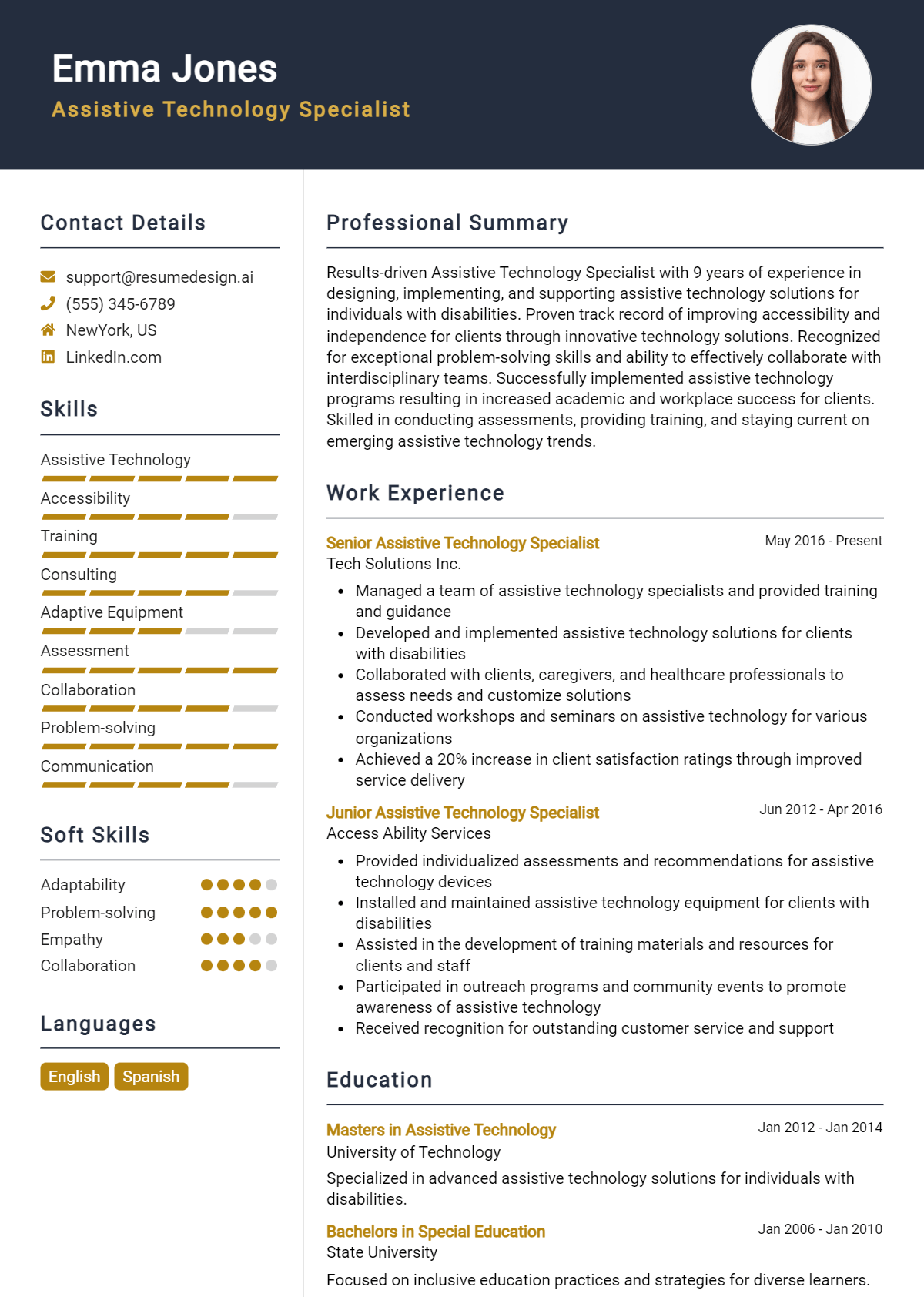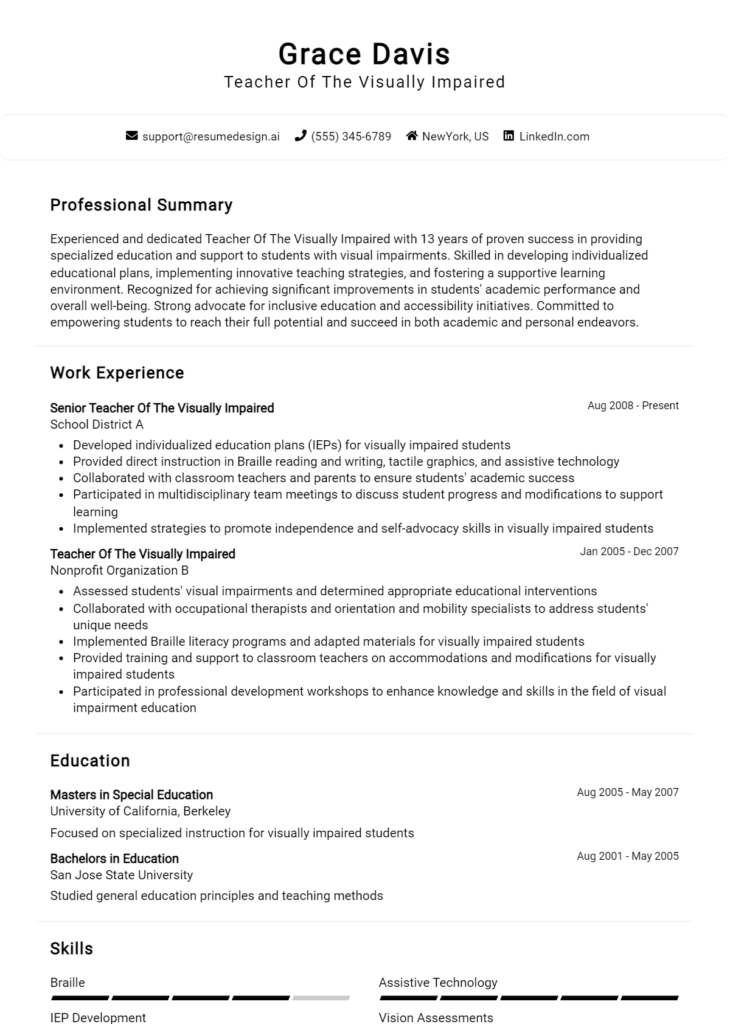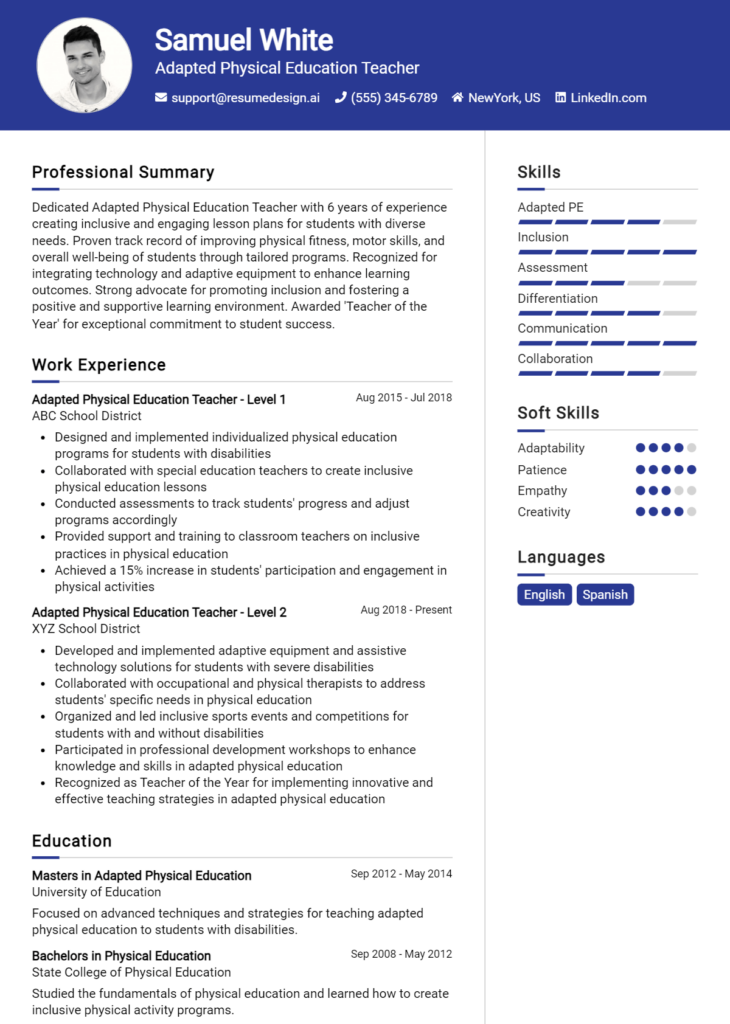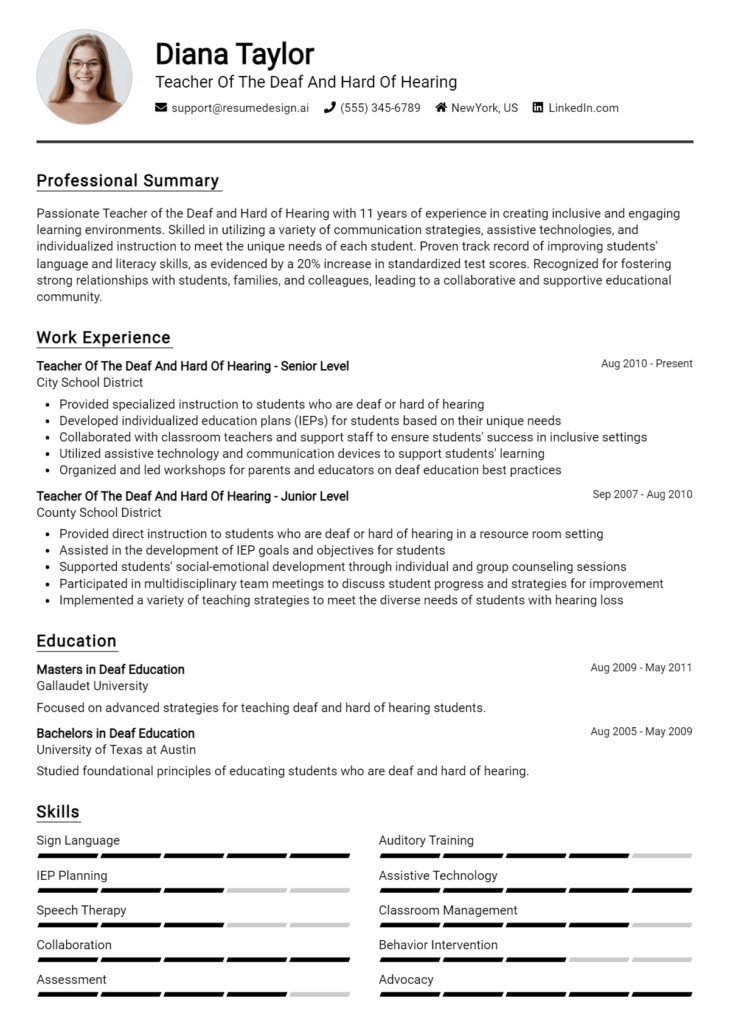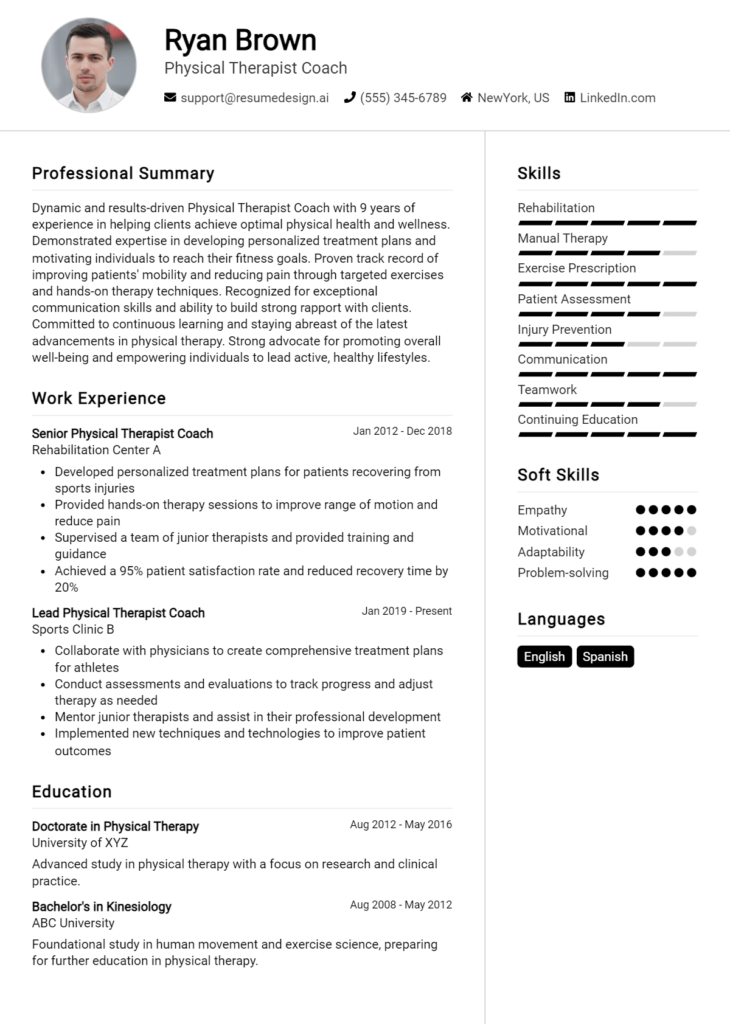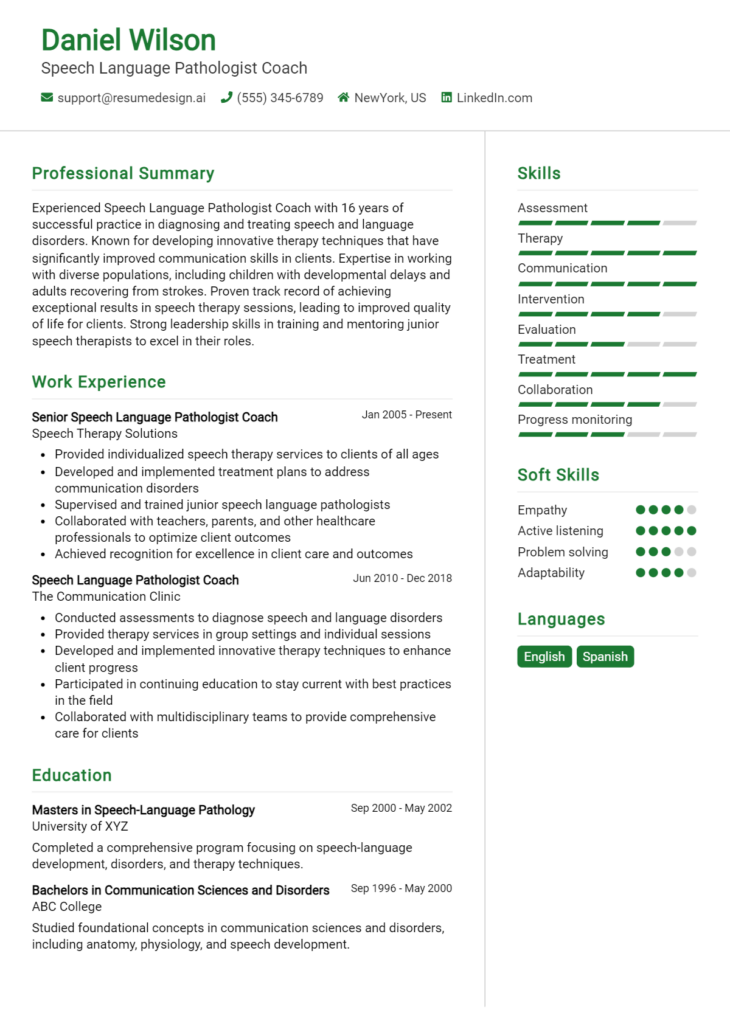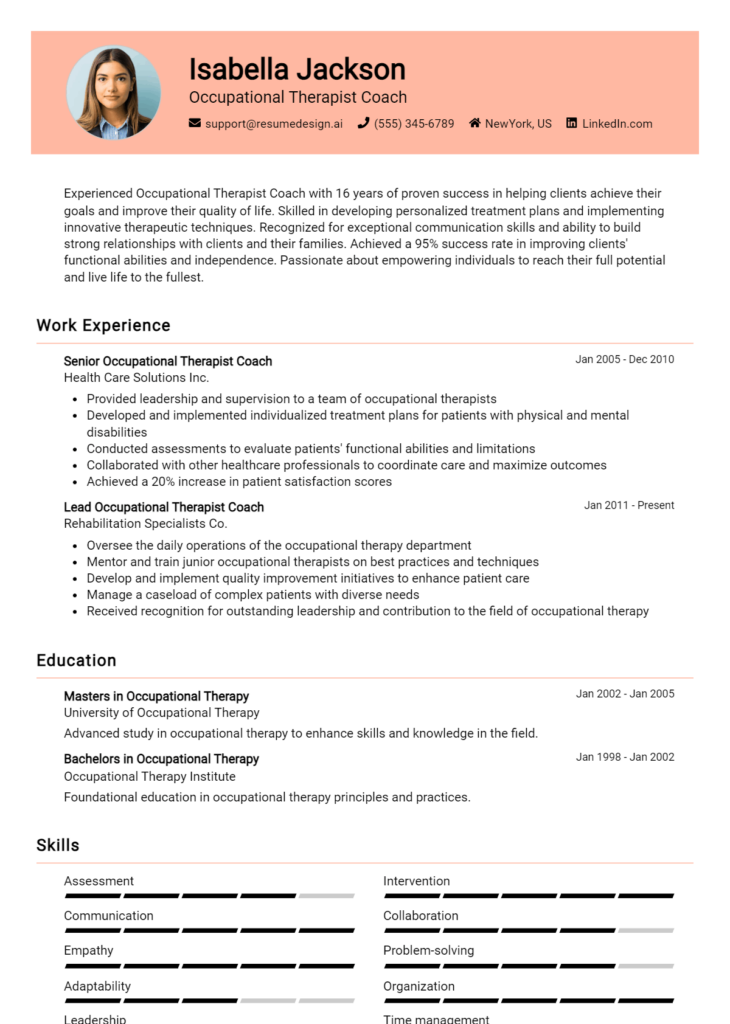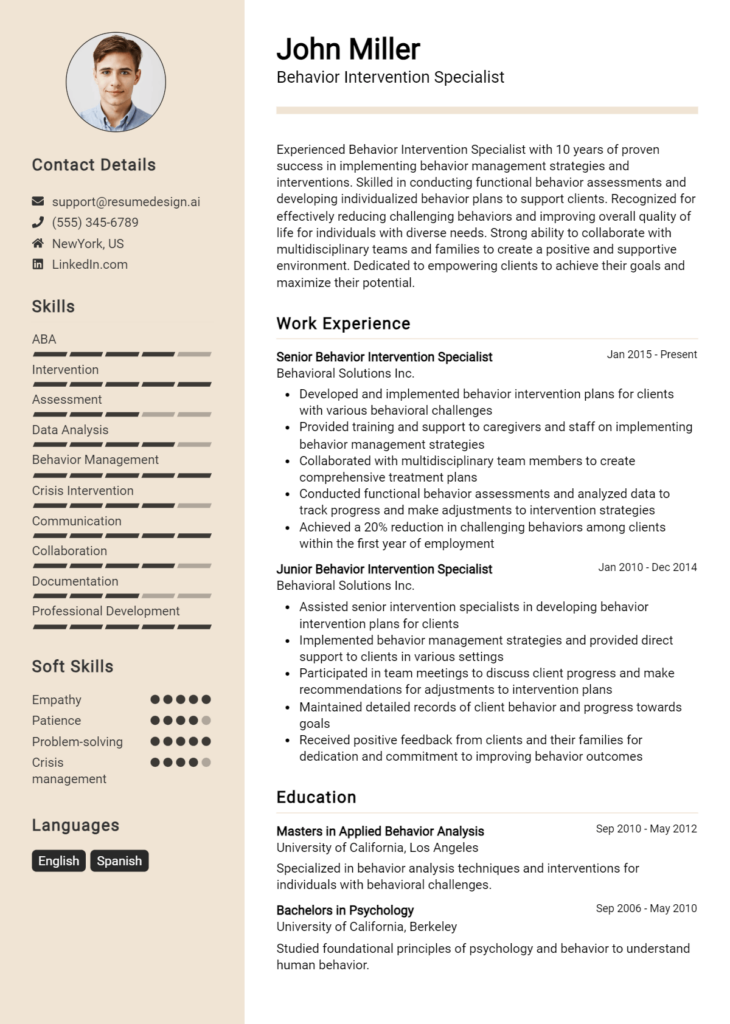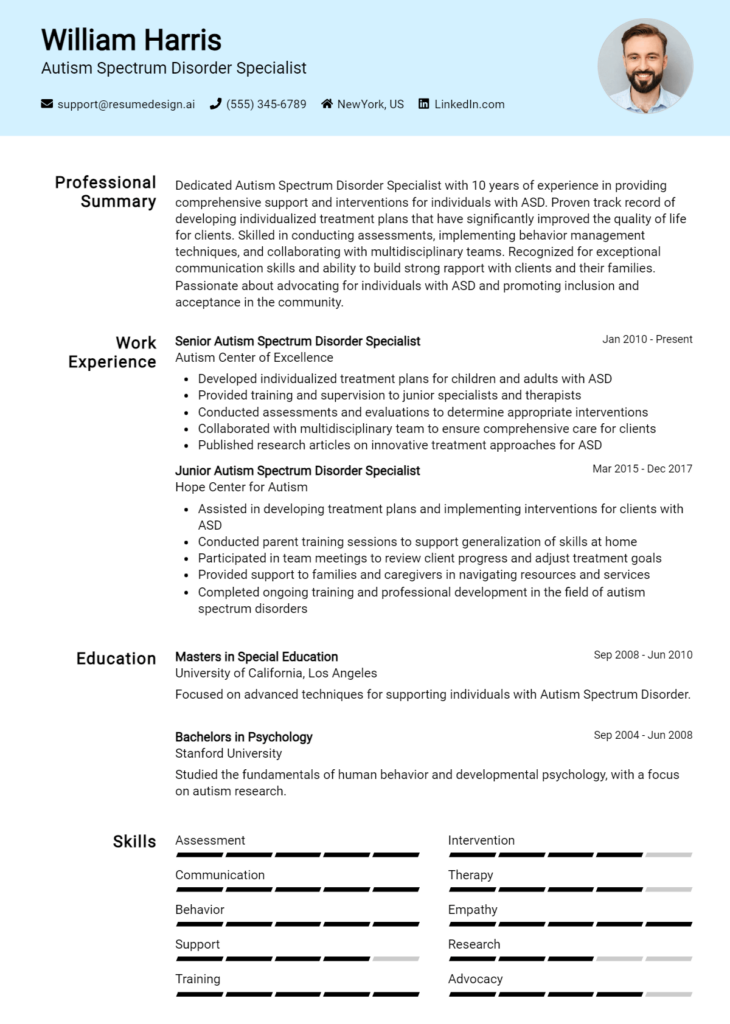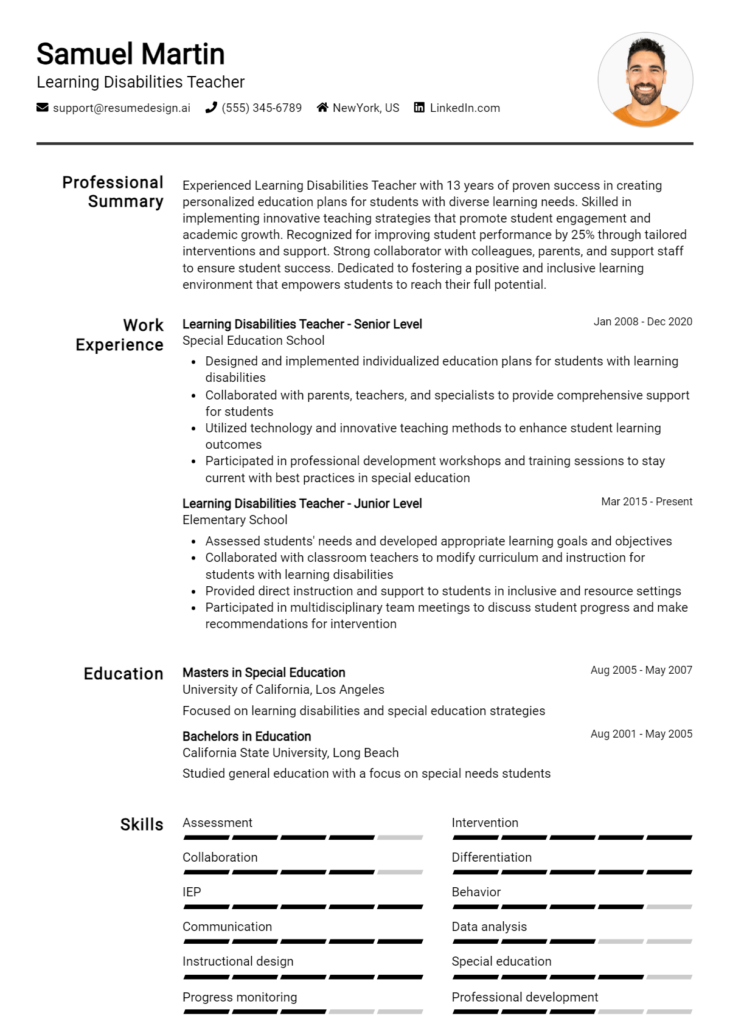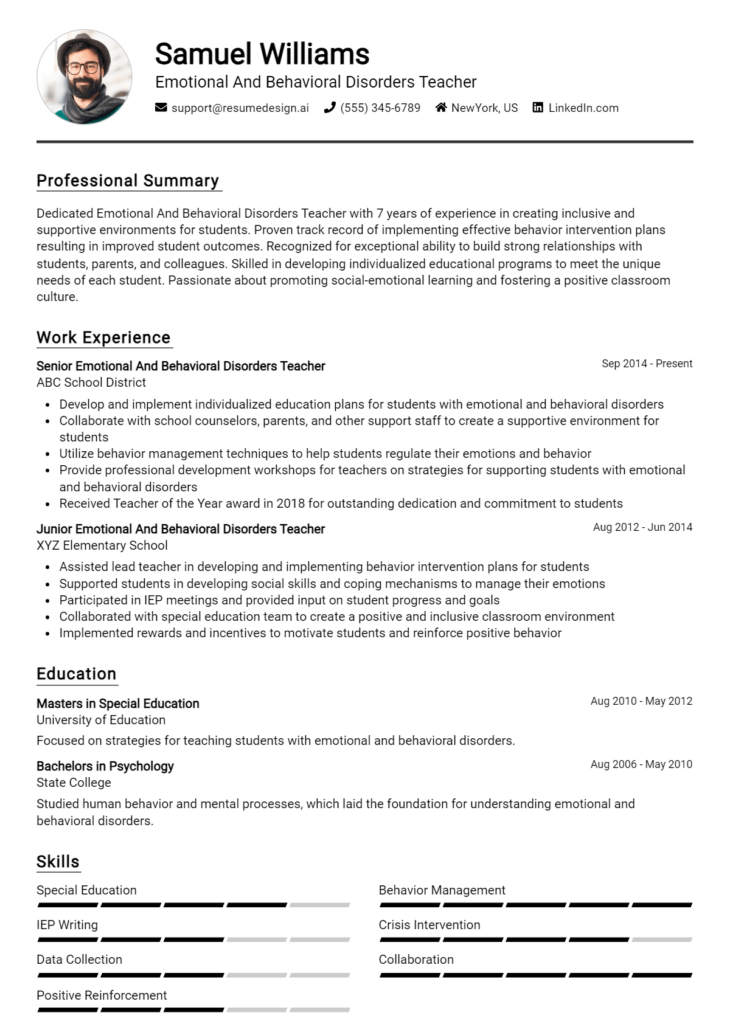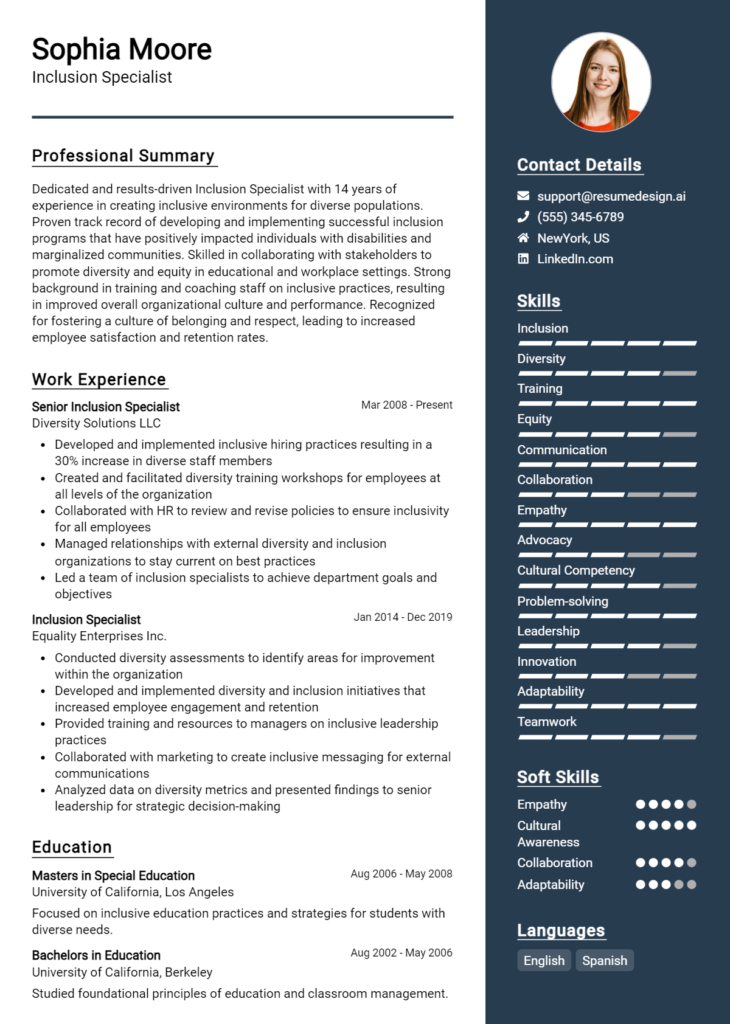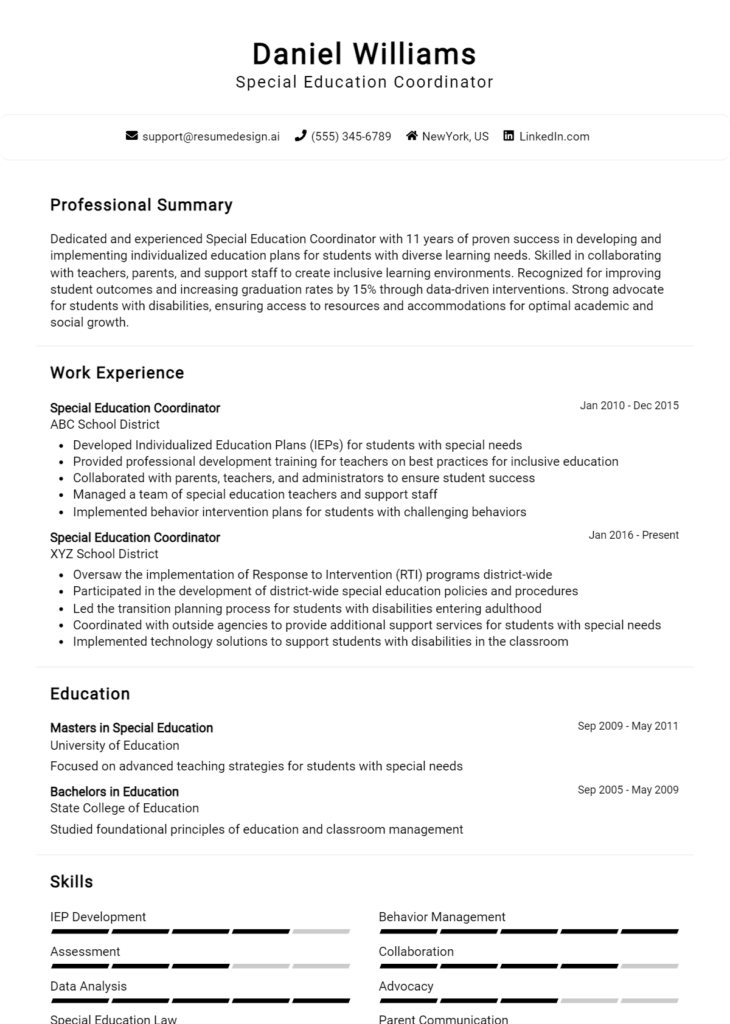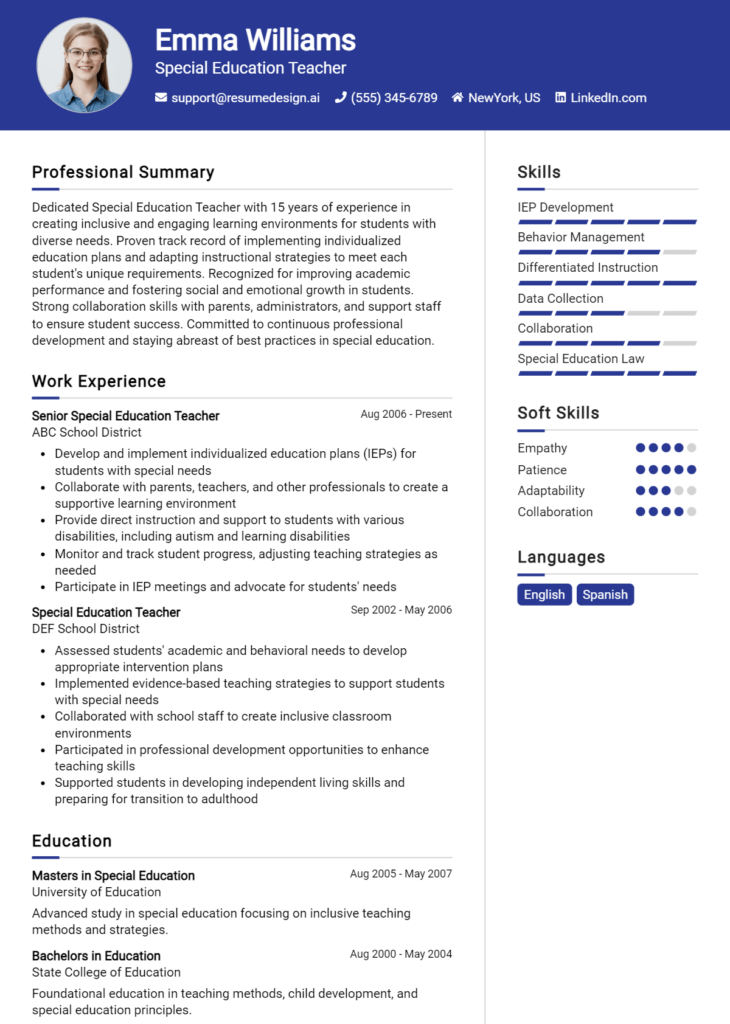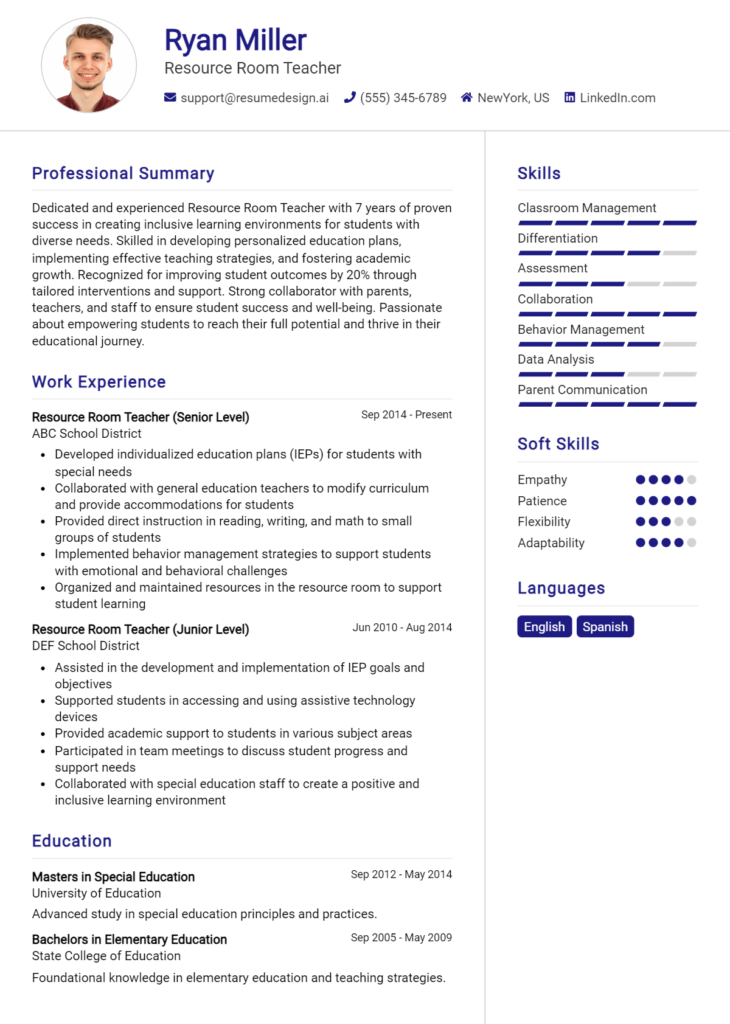Assistive Technology Specialist Core Responsibilities
An Assistive Technology Specialist plays a crucial role in enhancing accessibility and inclusion within an organization. Key responsibilities include assessing individual needs, recommending suitable assistive devices, training users, and collaborating with various departments to integrate technology solutions. Essential skills encompass technical proficiency, operational knowledge, and strong problem-solving capabilities, which enable the specialist to effectively bridge the gap between users and technology. These skills contribute significantly to achieving organizational goals, and a well-structured resume can effectively showcase these qualifications to potential employers.
Common Responsibilities Listed on Assistive Technology Specialist Resume
- Conduct assessments to determine assistive technology needs.
- Research and recommend appropriate assistive devices and software.
- Provide training and support for users of assistive technology.
- Collaborate with educators, therapists, and other professionals.
- Develop and implement individualized technology plans.
- Monitor and evaluate the effectiveness of assistive solutions.
- Stay updated on the latest technology trends and innovations.
- Create documentation and user manuals for assistive devices.
- Advocate for increased accessibility within the organization.
- Assist in the procurement and maintenance of assistive technologies.
- Facilitate workshops and training sessions on technology use.
- Maintain records of technology assessments and user progress.
High-Level Resume Tips for Assistive Technology Specialist Professionals
In today’s competitive job market, a well-crafted resume is essential for Assistive Technology Specialist professionals looking to make a lasting impression on potential employers. Your resume is often the first opportunity to showcase your unique skill set, relevant achievements, and passion for enhancing accessibility through technology. It serves as a powerful marketing tool that can open doors to interviews and career advancement. In this guide, we will provide practical and actionable resume tips specifically tailored for Assistive Technology Specialists, helping you to effectively communicate your qualifications and stand out in your field.
Top Resume Tips for Assistive Technology Specialist Professionals
- Tailor your resume to each job description by incorporating keywords and phrases that match the requirements outlined by the employer.
- Highlight your relevant experience in assistive technology, including roles where you provided support or implemented solutions for individuals with disabilities.
- Quantify your achievements with specific metrics, such as the number of clients served, the percentage of improved outcomes, or the success rates of the technologies implemented.
- Showcase your proficiency with industry-specific tools and software, such as screen readers, communication devices, or adaptive equipment.
- Include certifications or training related to assistive technology, demonstrating your commitment to professional development and expertise in the field.
- Emphasize your soft skills, such as empathy, communication, and problem-solving, as these are crucial for effectively working with clients and stakeholders.
- Incorporate a professional summary at the top of your resume that encapsulates your career goals and key qualifications as an Assistive Technology Specialist.
- Utilize a clean, organized format that allows for easy readability, ensuring that hiring managers can quickly identify your key skills and experiences.
- Consider adding a section for relevant volunteer work or community involvement, underscoring your dedication to promoting accessibility and inclusion.
By implementing these tips, Assistive Technology Specialist professionals can significantly enhance their resumes, increasing their chances of landing a job in this rewarding and impactful field. A well-structured resume that effectively communicates your qualifications and passion for assistive technology will not only attract the attention of hiring managers but also set you on the path to a fulfilling career dedicated to improving the lives of others.
Why Resume Headlines & Titles are Important for Assistive Technology Specialist
In the competitive field of assistive technology, having a compelling resume headline or title is crucial for an Assistive Technology Specialist. A strong headline serves as an immediate hook, capturing the attention of hiring managers and succinctly summarizing a candidate's key qualifications in a single, impactful phrase. It should be concise, relevant, and directly aligned with the job being applied for, effectively setting the tone for the rest of the resume. When crafted well, a headline can differentiate a candidate from the rest of the applicants, providing a quick snapshot of their expertise and making a lasting impression.
Best Practices for Crafting Resume Headlines for Assistive Technology Specialist
- Keep it concise: Aim for a brief phrase, ideally under 10 words.
- Be specific: Use terminology that clearly defines your role and expertise.
- Highlight key qualifications: Focus on your most relevant skills and experiences.
- Use action-oriented language: Start with a strong verb to convey proactivity.
- Align with job description: Tailor your headline to reflect the specific requirements of the position.
- Incorporate industry keywords: Use terms that are common in the assistive technology field.
- Showcase accomplishments: Include metrics or achievements if possible.
- Avoid clichés: Steer clear of overused phrases that lack originality.
Example Resume Headlines for Assistive Technology Specialist
Strong Resume Headlines
Innovative Assistive Technology Specialist with 5+ Years Experience
Certified AT Specialist Enhancing Accessibility for Diverse Needs
Dedicated Professional Committed to Empowering Individuals with Disabilities
Results-Driven Assistive Technology Expert Focused on User-Centric Solutions
Weak Resume Headlines
Assistive Technology Specialist
Looking for a Job in Assistive Technology
Experienced in Technology
The strong headlines are effective because they clearly communicate the candidate's expertise, experience, and commitment to the field of assistive technology, making them stand out to hiring managers. In contrast, the weak headlines fail to impress due to their vagueness and lack of specificity, providing little insight into the candidate's qualifications or unique value proposition. A compelling headline is essential in making a strong first impression and inviting further consideration of the resume.
Writing an Exceptional Assistive Technology Specialist Resume Summary
A well-crafted resume summary is crucial for an Assistive Technology Specialist, as it serves as the first impression for hiring managers. This brief yet powerful section succinctly highlights the candidate's key skills, relevant experience, and notable accomplishments in the field of assistive technology. A strong resume summary quickly captures attention and sets the tone for the rest of the resume, demonstrating the candidate's qualifications and fit for the specific job role. It should be concise, impactful, and tailored to align with the job description, ensuring that it resonates with the employer’s needs.
Best Practices for Writing a Assistive Technology Specialist Resume Summary
- Quantify Achievements: Use specific numbers or percentages to highlight your contributions and results.
- Focus on Skills: Emphasize both technical and interpersonal skills relevant to assistive technology.
- Tailor to the Job Description: Customize your summary to reflect the keywords and requirements mentioned in the job posting.
- Highlight Relevant Experience: Include specific roles or projects that showcase your expertise in assistive technology.
- Keep it Concise: Aim for 2-4 sentences that convey your strengths and value proposition effectively.
- Use Action Verbs: Start with dynamic verbs that convey your contributions and achievements.
- Showcase Problem-Solving Skills: Highlight instances where you successfully resolved challenges in assistive technology.
- Be Authentic: Reflect your unique style and personality while remaining professional.
Example Assistive Technology Specialist Resume Summaries
Strong Resume Summaries
Dynamic Assistive Technology Specialist with over 5 years of experience in evaluating and implementing customized technology solutions for individuals with disabilities. Successfully improved user satisfaction by 30% through tailored training programs and ongoing support.
Results-driven professional with a proven track record of enhancing accessibility in educational settings. Developed and executed assistive technology training for over 200 staff members, leading to a 40% increase in student engagement.
Dedicated Assistive Technology Specialist skilled in collaborating with multidisciplinary teams to assess needs and deliver innovative solutions. Achieved a 25% reduction in equipment downtime through proactive maintenance and user education initiatives.
Weak Resume Summaries
Assistive Technology Specialist with experience in various roles. I have worked with people with disabilities and understand their needs.
Knowledgeable about assistive technology tools and how they can help individuals. I enjoy helping others and have done so in my previous jobs.
The strong resume summaries are effective because they provide specific examples of achievements, quantify results, and highlight relevant skills that directly relate to the Assistive Technology Specialist role. In contrast, the weak summaries lack detail, specificity, and quantifiable outcomes, making them less compelling and memorable to hiring managers. By using clear metrics and focused language, strong summaries significantly enhance the candidate's appeal in a competitive job market.
Work Experience Section for Assistive Technology Specialist Resume
The work experience section of an Assistive Technology Specialist resume is a critical component that illustrates the candidate's technical skills, leadership abilities, and capacity to deliver high-quality products. This section not only highlights relevant job roles but also provides insight into how the candidate has successfully applied their expertise in real-world settings. By quantifying achievements and aligning their experience with industry standards, candidates can effectively demonstrate their value to potential employers. A well-crafted work experience section can set a candidate apart in a competitive job market, showcasing their ability to manage teams and execute projects that enhance accessibility and improve user experience.
Best Practices for Assistive Technology Specialist Work Experience
- Use clear and concise language to describe your roles and responsibilities.
- Quantify achievements with specific metrics (e.g., improved user satisfaction by 30%).
- Highlight technical skills relevant to assistive technologies (e.g., software development, device implementation).
- Demonstrate leadership by mentioning team management or cross-departmental collaboration.
- Align your experiences with industry standards and best practices.
- Include certifications and training relevant to assistive technology.
- Showcase projects that had a measurable impact on user accessibility.
- Utilize action verbs to convey a sense of proactivity and results-driven performance.
Example Work Experiences for Assistive Technology Specialist
Strong Experiences
- Led a team of 5 in developing a mobile application that increased accessibility for users with disabilities, resulting in a 40% increase in user engagement.
- Implemented assistive technology solutions in a university setting that improved learning outcomes for 200+ students, achieving a 25% rise in academic performance.
- Conducted workshops for over 100 educators on integrating assistive technologies in the classroom, leading to a 50% increase in technology adoption rates among staff.
- Managed a project to redesign workplace ergonomics, which decreased employee injuries by 15% and enhanced productivity by 20%.
Weak Experiences
- Worked on various projects related to assistive technology.
- Helped with user training sessions.
- Participated in team meetings to discuss technology.
- Involved in the implementation of new tools.
The examples provided illustrate the contrast between strong and weak experiences. Strong experiences are characterized by specific achievements and measurable outcomes, demonstrating the candidate's impact and expertise in the field of assistive technology. They highlight leadership roles and collaborative efforts that resulted in significant improvements. Conversely, weak experiences lack detail and quantifiable results, making them less compelling to potential employers. By focusing on concrete contributions and aligning with industry standards, candidates can present a more powerful narrative of their professional journey.
Education and Certifications Section for Assistive Technology Specialist Resume
The education and certifications section of an Assistive Technology Specialist resume is crucial as it underscores the candidate's academic qualifications, relevant industry certifications, and commitment to ongoing professional development. This section not only highlights the candidate’s foundational knowledge and expertise in assistive technology but also showcases their dedication to staying abreast of the latest tools, methodologies, and best practices in the field. By including pertinent coursework, certifications, and specialized training, candidates can significantly boost their credibility and demonstrate their alignment with the specific requirements of the job role, enhancing their overall competitiveness in the job market.
Best Practices for Assistive Technology Specialist Education and Certifications
- List relevant degrees first, ensuring they are directly related to assistive technology or related fields such as special education, rehabilitation counseling, or occupational therapy.
- Include industry-recognized certifications like Assistive Technology Professional (ATP) or Certified Rehabilitation Technology Specialist (CRTS) to validate your expertise.
- Highlight any specialized training programs or workshops attended that focus on the latest assistive technologies and methodologies.
- Provide details of relevant coursework that pertains to assistive technology, human-computer interaction, or disability studies.
- Use clear formatting to distinguish between degrees, certifications, and training for easy readability.
- Keep the section up-to-date by removing outdated credentials that no longer hold relevance in the current job market.
- Tailor the content of this section to align with the specific job description, emphasizing qualifications that are most applicable.
- Consider including any ongoing education efforts, such as online courses or seminars, to showcase a commitment to continuous learning.
Example Education and Certifications for Assistive Technology Specialist
Strong Examples
- M.S. in Rehabilitation Counseling, University of XYZ, 2022
- Assistive Technology Professional (ATP) Certification, Rehabilitation Engineering and Assistive Technology Society of North America (RESNA), 2023
- Coursework in Human-Computer Interaction, University of ABC, completed 2021
- Training in Augmentative and Alternative Communication (AAC) Devices, completed 2022
Weak Examples
- Bachelor’s in Business Administration, University of XYZ, 2018
- Certification in Basic Computer Skills, Online Learning Platform, 2020
- High School Diploma, Generic High School, 2015
- Outdated certification in Office Software Suite, 2019
The strong examples provided reflect educational qualifications and certifications that are directly relevant to the role of an Assistive Technology Specialist, indicating a solid foundation in the field and a commitment to professional growth. In contrast, the weak examples illustrate a lack of relevance to the specific job requirements, showcasing qualifications that do not align with the skills and knowledge needed for a successful career in assistive technology. These distinctions help potential employers assess the candidate's suitability more effectively.
Top Skills & Keywords for Assistive Technology Specialist Resume
The role of an Assistive Technology Specialist is pivotal in enhancing the quality of life for individuals with disabilities. A well-crafted resume showcasing the right skills can significantly influence hiring decisions. Emphasizing both hard and soft skills allows candidates to demonstrate their technical expertise and interpersonal abilities, which are essential for effectively assessing client needs and implementing appropriate assistive technologies. Highlighting these skills not only reflects a candidate's qualifications but also their commitment to fostering independence and improving accessibility for those they serve.
Top Hard & Soft Skills for Assistive Technology Specialist
Soft Skills
- Empathy
- Communication
- Problem-solving
- Patience
- Adaptability
- Active listening
- Collaboration
- Critical thinking
- Creativity
- Time management
- Advocacy
- Cultural competence
- Interpersonal skills
- Conflict resolution
- Teamwork
Hard Skills
- Knowledge of assistive technology devices
- Proficiency in software applications
- Assessment and evaluation techniques
- Training and support for users
- Familiarity with disability laws and regulations
- Technical writing
- Data analysis and reporting
- Experience with customization of technology solutions
- Understanding of user-centered design principles
- Project management
- Hardware troubleshooting
- Research skills
- Knowledge of accessibility standards
- Device installation and maintenance
- Familiarity with educational technology tools
- Software development lifecycle understanding
- Networking and system integration
To further enhance your resume, explore more about essential skills and how to effectively present your work experience.
Stand Out with a Winning Assistive Technology Specialist Cover Letter
I am excited to apply for the position of Assistive Technology Specialist at [Company Name], as advertised on [Job Posting Source]. With a strong background in both special education and technology integration, I am passionate about empowering individuals with disabilities through innovative assistive technology solutions. My experience includes working directly with students and adults to assess their unique needs and develop tailored strategies that enhance their learning and communication capabilities.
In my previous role at [Previous Company/Organization Name], I successfully implemented a variety of assistive technologies, including speech-to-text software, adaptive devices, and customized learning applications. I collaborated with educators and therapists to conduct assessments and create individualized education plans (IEPs) that align with each client’s goals. My ability to train both staff and users on new technologies has resulted in increased confidence and independence for many individuals, as well as improved overall outcomes in their personal and academic lives.
I am particularly drawn to [Company Name] because of your commitment to innovation and inclusivity. I admire your initiatives that promote accessibility and believe that my skills in evaluating, selecting, and implementing assistive technologies can significantly contribute to your mission. I am eager to bring my expertise in user-centered design and my passion for advocacy to your team, ensuring that all individuals have the tools they need to thrive.
Thank you for considering my application. I look forward to the opportunity to discuss how my background and skills align with the needs of your organization. I am enthusiastic about the possibility of contributing to your team and making a positive impact in the lives of those who rely on assistive technology.
Common Mistakes to Avoid in a Assistive Technology Specialist Resume
When crafting a resume for the role of an Assistive Technology Specialist, it's crucial to present your skills and experiences effectively. However, many candidates make common mistakes that can hinder their chances of landing an interview. Understanding these pitfalls can help you create a more compelling and professional resume that showcases your qualifications in the best light.
Lack of Specificity: Failing to include specific technologies or tools you've worked with can make your resume less impactful. Be sure to mention assistive technologies you are proficient in, such as screen readers or communication devices.
Ignoring Keywords: Many organizations use applicant tracking systems (ATS) to filter resumes. Not including relevant keywords from the job description may result in your resume being overlooked.
Overly Complex Language: While it's important to demonstrate your expertise, using jargon or overly technical language can alienate readers. Aim for clear and concise language that is accessible to all.
Neglecting Soft Skills: While technical skills are important, soft skills like empathy, patience, and communication are equally vital for an Assistive Technology Specialist. Be sure to highlight these qualities.
Poor Formatting: A cluttered or unorganized resume can make it difficult for hiring managers to find key information. Use clear headings, bullet points, and consistent formatting to enhance readability.
Omitting Relevant Experience: Some candidates may overlook including volunteer work or internships that relate to assistive technology. Even non-paid experiences can demonstrate your commitment and expertise in the field.
Not Tailoring the Resume: Sending out a generic resume can be detrimental. Tailoring your resume to match the specific requirements and culture of the organization shows your enthusiasm and attention to detail.
Skipping Quantifiable Achievements: Failing to include measurable accomplishments can weaken your resume. Whenever possible, quantify your achievements, such as the number of clients assisted or improvements in user satisfaction.
Conclusion
As we explored the vital role of an Assistive Technology Specialist, we highlighted the key responsibilities, necessary skills, and the impact these professionals have on enhancing accessibility for individuals with disabilities. The importance of staying updated with the latest assistive technologies and developing tailored solutions was emphasized, alongside the need for effective communication skills to collaborate with clients and other professionals.
In conclusion, if you are pursuing a career as an Assistive Technology Specialist or looking to enhance your current resume, now is the perfect time to take action. Review your resume to ensure it reflects your qualifications and experience in this dynamic field. Utilize available resources such as resume templates, a user-friendly resume builder, and resume examples to craft a standout document. Additionally, don’t forget to check out cover letter templates to complement your application. Start refining your resume today and take the next step in your career journey!

